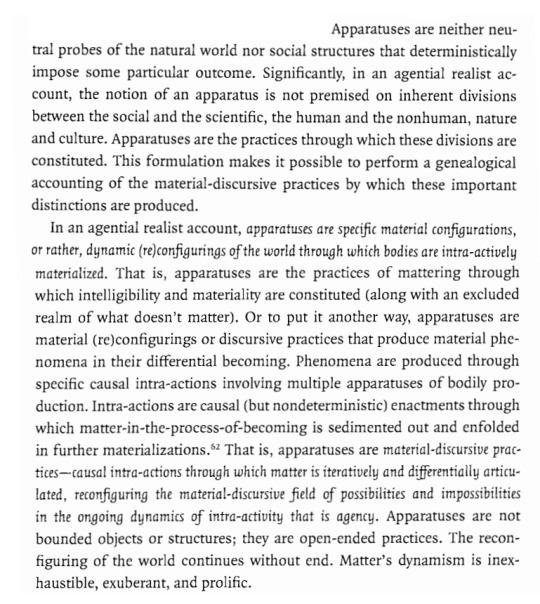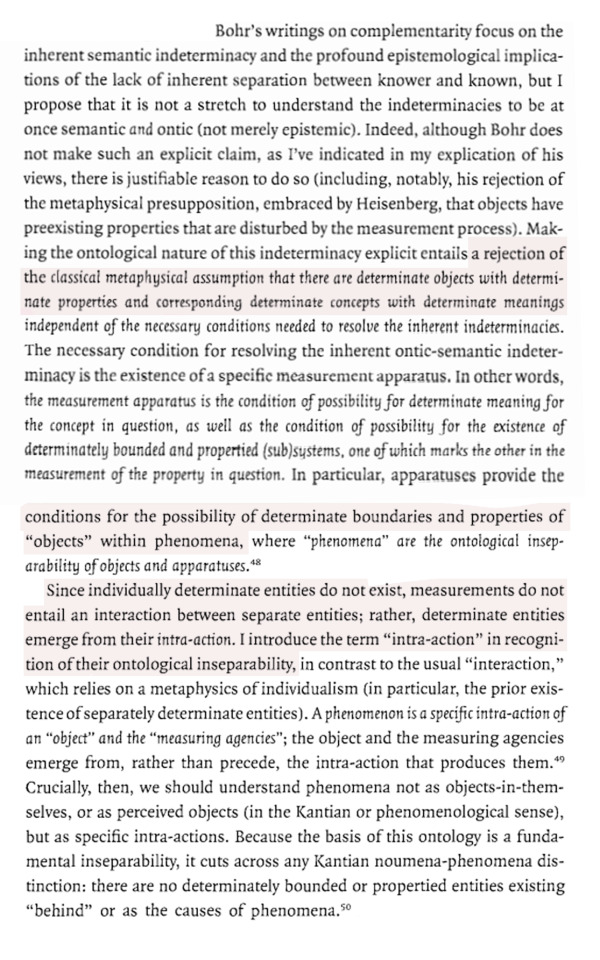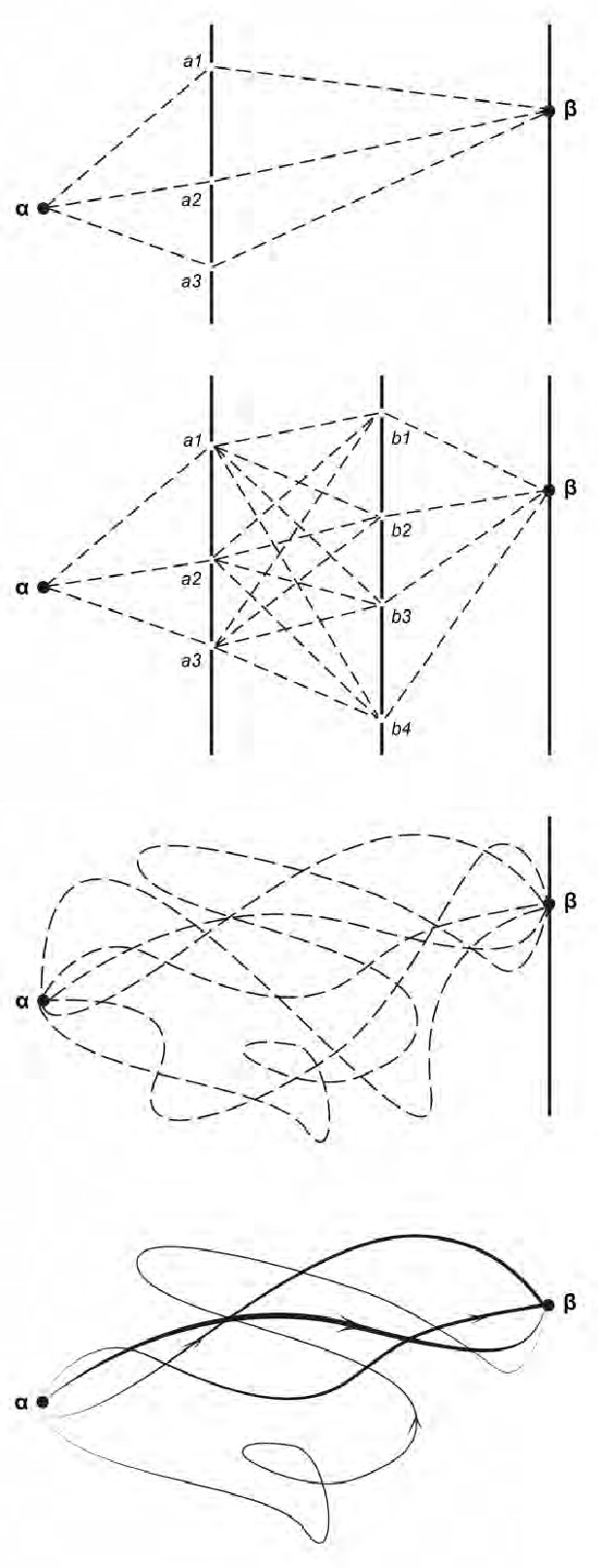#karen barad
Text

Excerpt from Karen Barad's Meeting the Universe Halfway
23 notes
·
View notes
Text
“If the measurement intra-action plays a constitutive role in what is measured, then it matters how something is explored. In fact, this is born out empirically in experiments with matter (and energy): when electrons (or light) are measured using one kind of apparatus, they are waves; if they are measured in a complementary way, they are particles. Notice that what we're talking about here is not simply some object reacting differently to different probings but being differently. What is at issue is the very nature of nature. A quantum ontology deconstructs the classical one: there are no pre-existing individual objects with determinate boundaries and properties that precede some interaction, nor are there any concepts with determinate meanings that could be used to describe their behavior; rather, determinate boundaries and properties of objects-within-phenomena, and determinate contingent meanings, are enacted through specific intra-actions, where phenomena are the ontological inseparability of intra-acting agencies.
Questions of the nature of measurement—or, more broadly, intra-actions—are at the core of quantum physics. Intra-actions are practices of making a difference, of cutting together-apart, entangling-differentiating (one move) in the making of phenomena. Phenomena—entanglements of matter/ing across spacetimes—are not in the world, but of the world.
[…]
Representation has confessed its shortcomings throughout history: unable to convey even the palest shadow of the Infinite, it has resigned itself to incompetence in dealing with the transcendent, cursing our finitude. But if we listen carefully, we can hear the whispered murmurings of infinity immanent in even the smallest details. Infinity is the ongoing material reconfiguring of nothingness; and finity is not its flattened and foreshortened projection on a cave wall, but an infinite richness.
The idea of finitude as lack is lacking. The presumed lack of ability of the finite to hold the infinite in its finite manifestation seems empirically unfounded.”
—Karen Barad, “What Is The Measure of Nothingness?”
8 notes
·
View notes
Text

karen barad, meeting the universe halfway: quantum physics and the entanglement of matter and meaning (2007)
5 notes
·
View notes
Quote
Quanta are my soul sisters. We have multiple identities. We can't be explained away by categories which are taken to be 'objective,' 'natural,' 'universal' -- existing outside of language, gender, sexuality, humanity, space-time (culture-history).
Karen Barad, "Meeting the Universe Halfway: Realism and Social Contructivism without Contradiction", 1996
#karen barad#quantum physics#both and#to read#their 2007 book of similar title#an actual physicist#employing metaphor and analysis#rather than the usual quantum woo
1 note
·
View note
Text
karen my love, you're too autistic even for ME.
0 notes
Text
les nuages les 1er témoins ?
1 note
·
View note
Text
[Fare mondo][Liana Borghi]
“L’importante è il viaggio, non l’approdo”. Così scrive Liana Borghi in uno dei sedici scritti, editi e inediti, che compon- gono questa raccolta, e che spaziano dal 1996 al 2019. L’autrice, punto di riferimento imprescindibile per il pensiero e il movimento “transfemministalesboqueer” italiano, ci accompagna in un appassionante viaggio che attraversa attivismo, teoria e letteratura, man- tenendo…

View On WordPress
#2023#Adrienne Rich#Audre Lorde#Clotilde Barbarulli#Donna Haraway#Edizioni ETS#Fare mondo#Federica Frabetti#Italia#Karen Barad#LGBT#Liana Borghi#Marco Pustianaz#nonfiction#Paul B. Preciado#Pratiche affettive e letture r/esistenti#Saggi#Saggistica#Sara Ahmed#transfemministalesboqueer
0 notes
Text
Anyway, TGIF. I'm gonna go read a 500-page book about an ontology and epistemology based on Bohr's understanding of quantum physics. Expecting my brain to become porridge in 2h.
#grad school woes#its called meeting the universe halfway by karen barad#super complex but so interesting
5 notes
·
View notes
Text
On Touching: a review
I was confused when I first saw Karen Barad's talk at the Hold Me Now conference at Stedelijk Museum Amsterdam in 2018. Quantum Field Theory is a complex theme to grasp, and even though I have studied it several times, it seems as arduous every time.
In this post, I'm gonna summarize the contents of the talk–both for myself and the readers–and then say what I think about it.
So, what did Karen Barad talk about? The main notion is changing what it means to touch thanks to the Quantum Field Theory. In a physical sense, touching can be described as an interaction with the electromagnetic field between the electrons present in all matter. So, we don't literally touch things; we just interact with their electromagnetic field.
This is old news, though, so how does Quantum Field Theory come into play? First of all, thanks to the introduction of the famous theorem E=mc², we know that both fields (the energy) and the particles (the mass) are simultaneously one and the other. A quantum, the particle, is the minimum amount of a field. But most importantly, the theme of indeterminacy is brought up. In classical Physics, there is the matter and the void: two separate beings. But in Quantum Field Theory, they put a question mark on that idea: how do we know that the void is devoid of all matter? We may think of the void as a vacuum, a quantum state without energy. But virtually (a fundamental term), it isn't empty: it contains fleeting electromagnetic waves and particles that pop into and out of the quantum field, vacuum fluctuations. When studied not as fields but as quanta, these quantised indeterminacies are called Virtual Particles. They exist, but not in the present/presence.
The example that Barad gives is that of an electron, the subatomic particle that occurs in all atoms, entirely devoid of structure, inside the vacuum. As a result of time being indeterminacy, the electron does not exist as an isolated particle, and it constantly interacts with all the virtual particles of the vacuum in all possible ways. Infinite ways.
The physics community deemed this infinity of interactions perverse and immoral, as it involved the "touching" of potentially everything at every time. Even self-touching. To "normalize" it, they used the only other infinity present in the Quantum Field Theory: the presence of a single bare, "undressed" electron and the void as separate from one another, as it is surrounded by and filled with its infinite interactions. To "dress" the electron, physicists used these infinities against one another, creating a finite number.
This means that everything results from the subtraction of infinities; entailing everything is a massive overlaying of perversities. According to physicists, monstrosity and perversity are at the core of existence. Touching entails experiencing all others and the self. And touching the self entails feeling the stranger within. We all exist at every moment in an indeterminable number of instances throughout space and time, rendering identity indeterminable as well. What do existing and becoming mean in this context? Touching is not an act of the matter; touching is the matter, as a condensation of response-ability.
Finished the sum. I really hope that it is comprehensible. Writing it, I discovered that I started to understand what Barad was talking about and finally understood just a bit more Quantum Physics. Writing is essential for understanding.
So, on a less intelligent note, I found this talk incredibly interesting: the philosophical implications of this quantum theory are incredible, mainly from a queer standpoint. Identity, normality and stability are questioned, and it even highlighted male physicists' bias toward "abnormalities." As I see it, we all are in a constant flux of being, constantly changing and developing. There is no fixed gender, sexuality, societal role, etc. Everything can and will change, but our culture has put an enormous effort into opposing this. We are fundamentally scared of change, and the inexplicability of things: myths were created to explain natural events, and religions were invented to sort out the reason for existing. Culturally it's not easy identifying with a gender different from the one assigned to you at birth; changing identity again is even less accepted. This applies to sexuality as well, and even your work and marital situation. People don't take change for granted; they always consider it a rational explanation for everything. But what is rationality? Being something or someone is not a mathematical decision. It results from a feeling, an inside touch with the stranger within yourself, showing you their presence in that fixed moment in time.
Flesh and muscles don't define us. The interactions we have, the "touching" with everything at every time, make us who we are at a certain point of the fourth dimension. We are change.
3 notes
·
View notes
Text
testing out a change of scenery for writing my seminar paper where i move from my desk to the floor
#freddie.txt#grad school#i will literally sit on the floor to write about how coriolanus's wounds mirror karen barad's definition of the material-discursive#by being a meeting of the material scarred flesh and a gap which is filled with meaning by the other characters#and how also all of this is likable to barad's other idea of the intra-active#tomorrow will be the true test of can i write in an airport/on a plane
1 note
·
View note
Text

Excerpt from Karen Barad's Meeting the Universe Halfway
15 notes
·
View notes
Text
How is it that I did an entire master's degree in theoretical physics without ever once hearing of Karen Barad's "agential realist" interpretation of quantum mechanics? I need to order my thoughts on it a little, but at first glance, it seems to more elegant than just about any other interpretation that I've heard.
13 notes
·
View notes
Text

Barad, Karen. “Troubling time/s and ecologies of nothingness: re-turning, re-membering, and facing the incalculable.” new formations: a journal of culture/theory/politics 92 (2018): 56 - 86.
78 notes
·
View notes
Text
Flora Ocean Parkin - Electric Dreams Golden Sea - glorious multitracked vocals
In her debut solo release, Flora Ocean Parkin transmits the ecstatic. Expanding their voice into a shimmering tapestry and wrapping the listener in its golden threads. Reaching for the outer limits of her range, they chart a trajectory through maternal desire, phantom forms and a sensory understanding of the self, in order to trace a path to reconciliation and transcendence.
With a sound that nods to the otherworldly harmonies of the Bulgarian State Television Female Choir, the mutant aesthetics of Arca and the sonic world building of Lyra Pramuk, Flora manifests a palatial body of work that is intimately personal, rich and decadent. In doing so, they express the new materialist philosophy of Karan Barad through music, as if the atomic world itself were a cosmic choir to sing with.
'The music, and the life it distils, would not have been possible without the support of friends, family, and loved ones who've believed in me along the way. Special thanks to: Alex Keegan, Ayse Hassan, Ayla Octavia Keegan, El Hardwick, Orion Isaacs, Anouska Samms, Chris Penty, Mum, Dad, Chloë, Granny, Mary Goodhart, Tim Green, Kip Ives, Sorana Vieru, Bryony Phipps Wardle, Jamie Morell, Siân Williams, Nick Potter, Mena Shah, Mutualism. Thanks to Karen Barad for the words, worldings and wonder' - Flora Ocean Parkin
25% of label profits will be donated to genderedintelligence.co.uk
4 notes
·
View notes
Text
Letter
1.
In den letzten Jahren haben verschiedene Forschungen sich denjenigen Techniken und Objekten zugewandt, die bei der Formierung und (Re-)Produktion des Rechts und seiner Wissenschaften eine zwar untergeordnete, damit aber effektive Rolle spielen sollen. Die Konstellation untergeordneter Effektivität scheint mir nicht an Eigenheiten solcher Techniken und solcher Objekte zu liegen, sondern an deren Verwechselbarkeiten und Austauschbarkeiten. Man kann, wie das etwas Thomas Hensel tut, von schwachen Medien, schwachen Techniken und schwachen Objekten sprechen, nicht, weil sie weniger effektiv wären, sondern weil es nur einer kleinen Anzahl von Operationen bedarf, bis sie andere Medien, andere Techniken und andere Objekte, also auch etwas anderes als Medium, Technik und Objekt erscheinen. Ihre Effektivität ist ihrer leichten Verwechselbarkeit und Austauschbarkeit affin, sie sind insofern nur sekundär, nur und immerhin Effekte mit Effekten.
In der deutschsprachigen Literatur steht dafür der Name von Cornelia Vismann, die in den Neunziger Jahren anhand von Akten, Medien- oder Kulturtechniken einen Zugriff auf die Geschichte und Theorie des Rechts gewagt hatte, dessen Neuartigkeit unter anderem darin lag, Geschichte und Theorie jenseits Figuren „großer Trennung“ (Goody, Latour, Viveiros de Castro) zu entwerfen, damit auch alte und neue Zeiten, nahe und ferne Räume weiter unterscheidbar zu halten, die Distanz dieser Unterscheidung aber verkehrsfähig und verkehrbar zu halten und damit 'pendeln' (Warburg) zu lassen. Unterscheidungen, die für Rechtssysteme tragend sein sollen, wie etwa diejenigen zwischen Ostrom/ Westrom, Subjekt/ Objekt, Personen/ Dingen, Schriftlichkeit/ Mündlichkeit oder Wort/ Bild hat Vismann einer Kritik ihrer Dynamik und Details unterzogen, wie etwa in ihrer Interpretation von "Schreibstunden". Die Akte ist bei Vismann mal ein Medium (wie die notitia dignitatum), mal ein Objekt (wie die nackte Phryne), mal ein Subjekt (wie die nackte Phyrne), mal eine Handlung (wie der der Aktenakt). Akten sind korrumpierbar, sie verschlingen alles und sind allem verschlungen, lassen alles durchgehen. Vismann rekonstruiert sie insofern nicht über Generalisierungen, sondern über Details und Dynamik.
In der französischen Literatur verbindet man den Zugriff auf solche detaillierten und dynamischen Techniken mit so unterschiedlichen Namen wie Marta Madero mit ihrer Forschung zu angepinnten Tafeln, Yan Thomas zu römischen Operationen und Bruno Latour zum conseil d'etat.
In der englischen Literatur verbindet man diese Zugriffe auf Techniken und Objekte mit Namen wie Karen Barad, Susan Leigh Star oder Donna Haraway. Solche Zugriffe wollen wir bündeln und vertiefen, nicht aber auf ihrer Neuheit beharren. Insofern gilt unsere Tagung auch einer Archäologie der Letter und einer Archäologie minorer Objekte, die etwas lassen, indem sie gelassen sind. Wir spannen eine Bogen von der heute aktuellen situativen Ontologie zu den Situationisten und ihrem Verhältnis zu den Lettristen, weiter zu Carl Schmitts Dadaismus und noch weiter zu Rudolf von Jherings Scheide-, Digestiv-, Zersetzungs- und Zerlegungskunst sowie ihrer Destillation kleinster Zeichen und noch weiter zu Luthers Sendbriefen und weiter Passierscheinen der frühen Neuzeit. Archäologisch bauen wir eine Treppenszene auf, zum Auf- und Abstieg in entfernte Zeiten.
2 notes
·
View notes
Note
Hey Caden! I hope you are well!!! I’ve been reading Donna Haraway for my thesis for a Science Fiction course on ethnofuturism and I was wondering if you’ve ever read her stuff or if there was anything to correlate between Succession and her work since her comments on biomedical literature, nature, and artufactualism remind me both of what you’ve written and a lot of what Succession has said on the body and the manipulations of what is fact and fiction. I’m just curious so sorry for the weirdly worded ask and no pressure if it’s not a subject with a lot to comment on!
hi megan! i'm good ^_^ hope you're also well!
my familiarity with haraway is partially secondhand (ie, she pops up in a lot of people's footnotes, so i'm more likely to encounter her ideas that way than by reading her directly) but yes, i do think there are connections to be made here.
haraway works in a social constructivist paradigm (stop me if you've heard this before) that emphasises the socially embedded ('artifactual') nature of scientific theory and the artificiality of the boundaries between nature and culture, nature and technology, and technology and the body. my very strong opinion is that succession makes a lot of overlapping claims, such as by showing the socially constructed nature of truth (the roys constantly narrativise and re-narrativise, and the show rarely plays god by telling us who's 'correct'), and in the way the characters use language (the words are often empty, meaningless, or semantically re-deployed, thus challenging accepted categories of fact and methods of fact-making).
in this vein, i've written a little before about succession as post-structuralist. the major difference i would identify between haraway and succ (besides specific subject matter) is that haraway works in science and technology studies, a field with a predominantly sociological slant, whereas i think succ makes its critique more through the tools of historicisation. however, these methods obviously have a tendency to bleed into one another, and there's a reason most historians of the past few generations have a broadly constructivist philosophical orientation.
if you're into this stuff you might like some of the other sts/philsci classics (bruno latour, david bloor, paul feyerabend, sandra harding, simon schaffer) or the standard post-structuralists (deleuze, derrida, foucault, etc) or even some of the new materialists (jane bennett, karen barad, graham harman, quentin meillassoux). truly very sexy stuff i'm always reading succ through my little constructivist-historicist-materialist lens >:)
11 notes
·
View notes